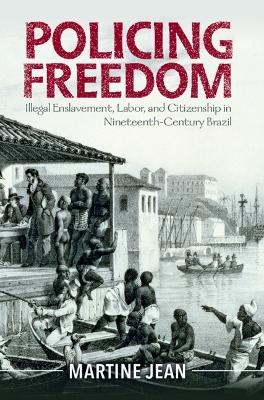
Policing Freedom
Illegal Enslavement, Labor, and Citizenship in Nineteenth-Century Brazil
Seiten
2023
Cambridge University Press (Verlag)
978-1-009-28911-5 (ISBN)
Cambridge University Press (Verlag)
978-1-009-28911-5 (ISBN)
Policing Freedom explores the history of punishment in Brazil, intersecting with studies on the global history of punishment, which historicize the prison as existing within a continuum of punitive strategies to discipline Brazil's racially diverse working-class. Key reading for students and scholars of the Atlantic slave trade.
Policing Freedom uses the case study of Brazil's first penitentiary, the Casa de Correção, to explore how the Brazilian government used incarceration and enforced labor to control the prison population during the foundational period of Brazilian state formation and postcolonial nation building. Placing this penitentiary within the global debates about the disciplinary benefits of confinement and the evolution of free labor ideology, Martine Jean illustrates how Brazil's political elites envisioned the penitentiary as a way to discipline the free working class. While participating in the debates about the inhumanity of the slave trade, philanthropists and lawmakers, both conservative and liberal, articulated a nation-building discourse that focused on reforming Brazil's vagrants into workers in anticipation of slavery's eventual demise, laying the racialized foundations for policing and incarceration in the post-emancipation period.
Policing Freedom uses the case study of Brazil's first penitentiary, the Casa de Correção, to explore how the Brazilian government used incarceration and enforced labor to control the prison population during the foundational period of Brazilian state formation and postcolonial nation building. Placing this penitentiary within the global debates about the disciplinary benefits of confinement and the evolution of free labor ideology, Martine Jean illustrates how Brazil's political elites envisioned the penitentiary as a way to discipline the free working class. While participating in the debates about the inhumanity of the slave trade, philanthropists and lawmakers, both conservative and liberal, articulated a nation-building discourse that focused on reforming Brazil's vagrants into workers in anticipation of slavery's eventual demise, laying the racialized foundations for policing and incarceration in the post-emancipation period.
Martine Jean is an independent scholar and historian of nineteenth-century Brazil, slavery, emancipation, race, and citizenship in the Atlantic World. Her work has been published in many journals including Atlantic Studies: Global Currents, The Journal of Social History and Slavery and Abolition. This is her first book.
Introduction. The rogues' gallery; 1. The politics of slavery, race, nation, and prison building; 2. Confinement, labor, and citizenship; 3. Prison labor and the politics of slavery; 4. Disciplining children and engendering racialized citizenship; 5. Adelino Mwissicongo and the afterlife of emancipation; Conclusion. Slavery's punitive afterlife; Appendix.
| Erscheinungsdatum | 09.08.2023 |
|---|---|
| Reihe/Serie | Afro-Latin America |
| Zusatzinfo | Worked examples or Exercises |
| Verlagsort | Cambridge |
| Sprache | englisch |
| Maße | 158 x 236 mm |
| Gewicht | 680 g |
| Themenwelt | Geisteswissenschaften ► Geschichte ► Regional- / Ländergeschichte |
| Recht / Steuern ► Strafrecht ► Kriminologie | |
| Sozialwissenschaften ► Soziologie ► Mikrosoziologie | |
| ISBN-10 | 1-009-28911-X / 100928911X |
| ISBN-13 | 978-1-009-28911-5 / 9781009289115 |
| Zustand | Neuware |
| Haben Sie eine Frage zum Produkt? |
Mehr entdecken
aus dem Bereich
aus dem Bereich
Erinnerungen
Buch | Softcover (2024)
Pantheon (Verlag)
16,00 €
Universalgelehrter, Polarreisender, Entdecker
Buch | Hardcover (2024)
mareverlag
28,00 €


